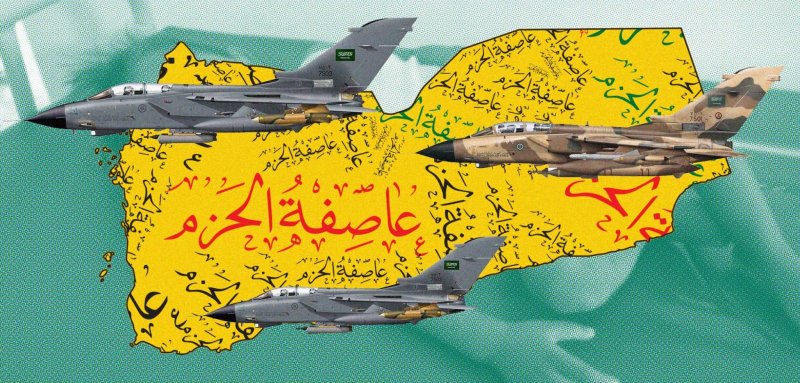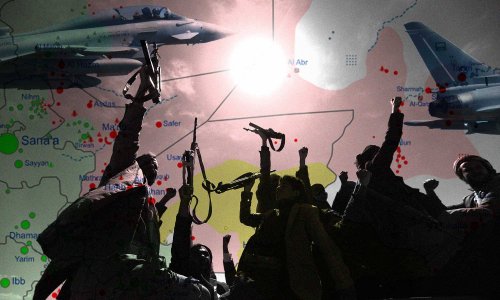Four years have passed since Saudi Arabia began its military intervention in Yemen (along with the so-called “Arab Coalition” it assembled), in what was at the time predicted to be a lightening military victory. Saudi airstrikes, it was presumed, would decisively change the military equilibrium on the ground in favour of the pro-government forces of Abd Rabbu Mansur Hadi – only for events to demonstrate the glaring error of this forecast.
The military operation – dubbed “Decisive Storm” – would commence at the request of President Hadi on March 26, 2015, with the participation of ten states (led by the states of the Gulf Cooperation Council, with the exception of Oman) and “the approval of the United States and international parties,” according to former Saudi Foreign Minister, and then-Saudi ambassador in Washington D.C., Adel al-Jubeir. Despite the predictions of a swift victory however, the military campaign continues to rage in the poverty-stricken country four years later (albeit under different titles), failing either to end the “Houthi coup” or reinforce the authority of the “legitimate government.”
Nor has the operation succeed in removing what the statement of the five participating Gulf states then decried as “the continuous threat to its security and stability” – citing the spread of heavy weaponry and short and long-range missiles “outside of the control of the legitimate government.” For the Houthi challenge of Saudi Arabia has since transformed from border manoeuvres to the active targeting of areas deep inside the Kingdom’s territory with ballistic missiles.
The Arab Coalition declared the end of “Decisive Storm” on April 21, 2015, along with the start of a new campaign: “Operation Restoring Hope.” However, notwithstanding the name change the Coalition’s military intervention would in reality be escalated – evolving in nature from launching airstrikes on Houthi positions to actively supporting pro-government ground forces. This development would further complicate the situation in the country, producing one of the most dangerous humanitarian crises of our time.
“The worst humanitarian crisis in the world”
The Saudi-led intervention has created a catastrophically-difficult situation for the majority of Yemenis – described in 2017 by United Nations (UN) Emergency Relief Coordinator Stephen O’Brien as “the worst humanitarian crisis in the world” – without delivering its promise of stability. The World Health Organisation (WHO) puts the number of Yemenis killed since the onset of the Coalition’s intervention at more than 10,000 – whilst other estimates indicate that the actual number may be up to five times higher.
The World Health Organisation (WHO) puts the number of Yemenis killed since the onset of the Coalition’s intervention at more than 10,000 – whilst other estimates indicate that the actual number may be up to five times higher.
Meanwhile, a February 2019 report by the UN Office for the Coordination of Humanitarian Affairs (OCHA) estimates that “80 percent of the population, that is approximately 24 million people, are in need of food aid or protection – including 14.3 million individuals requiring urgent assistance.”
The British charity ‘Save the Children’ adds that up to 85,000 children have died from starvation or disease between April 2015 and October 2018, while the French advocacy organisation ‘Action Against Hunger’ (ACF) puts the number of internally-displaced Yemenis at 3.3 million people – including 72% women and children, according to the UN Population Fund (UNFPA).
A cholera epidemic has also struck the country – resulting in the deaths of more than 2,500 people since April 2017 according to the World Health Organisation, while there are more than 1.2 million suspected cases of infection.
The reality of the cholera outbreak was personally experienced by Khaled al-Qadi, an activist in the National Foundation for Relief and Development (NFRD) in the province of Hajjah. He was lucky to escape death after falling ill during the outbreak.
Al-Qadi tells Raseef22 that the city of Hajjah, where he lived, lacked a medical centre specialised in the treatment of cholera. He was consequently misdiagnosed by doctors, who prescribed him treatments for normal diarrhoea. Khaled fell into a coma and almost experienced total kidney failure. He woke up days later to find himself in the Police Hospital in the capital city Sana’a, where he received treatment for an entire month.
Khaled says that hundreds have died from the disease, which he claims emerged after the war had “naturally led to the collapse of the health system, either by being subject to airstrikes or due to the absence of medicines as a result of the siege imposed on most Yemeni regions.”
Indeed, half of Yemen’s medical facilities have been damaged by military operations during the war – whilst 14.8 million Yemenis are estimated to lack the minimum level of healthcare.
Most dangerously perhaps, is the fact that current events are not heading in the direction of finding a solution to these problems. The UN High Commissioner for Refugees (UNHCR) predicts that the humanitarian crisis will continue in Yemen in 2019, with Yemenis requiring “unprecedented humanitarian needs.”
Catastrophic living conditions
A consequence of the war exacerbated by the intervention of the “Arab Coalition,” Yemenis today are experiencing a severe level of economic hardship. The majority of them haven’t received salaries for many months – especially in areas under Houthi control, where most of the population still resides – with the country’s economic conditions deteriorating to a stage of total collapse.
According to a report by the ‘Studies and Economic Media Center’ (SEMC), Yemen witnessed its most severe economic deterioration in 2018 – with the value of the Yemeni Riyal collapsing by more than 400% before staging a relative recovery. 2018 also witnessed the heaviest wave of price-increases in basic commodities since the start of the war, reaching an average of 28%.
Yemen witnessed its most severe economic deterioration in 2018 – with the value of the Yemeni Riyal collapsing by more than 400% before staging a relative recovery.
It should be noted here that this deterioration takes place in a country where, according to reports by human rights groups, 17.8 million of citizens already suffer from food insecurity – including 8.4 million at risk of famine. A further 1.1 million pregnant Yemeni women suffer from malnutrition, according to other reports.
The SEMC report also states that more than 40% of Yemeni families have lost their source of income during the war. One of these is Ali Fadel, one of 1.5 million employees who have not received their salaries – in his case, for more than two years.
Speaking to Raseef22, Fadel says that he is no longer able to bear too many more of life’s burdens: the war has robbed him of both his dreams and the rent he used to provide for the small home which sheltered him and his wife and two children, and his family’s circumstances have become dire. A few days ago, his troubles were further compounded by the surprise arrival of a lawsuit from his landlord, asking him to move out of his home and pay his overdue rent.
That rent, Fadel says, and the rent payments of countless other Yemenis would not have stopped were it not for the protracted nature of the Coalition’s military operations, who he says have “joined with the Houthis in suffocating the Yemenis who suffer from everything.”
Ongoing battles
In a statement on the fourth anniversary of what he labelled “the resilience”, the official Houthi spokesman Yahya Saree’ announced the killing of more than 20 Saudi soldiers and the seizure of military equipment in an operation targeting positions inside the southern Saudi province of Jizan – thus confirming that the Arab Coalition has failed even in the task of securing Saudi Arabia’s borders, and posing serious questions around the benefit of the military operation that has entered its fifth year.
The announcement comes at a time when the truce agreed in Stockholm between the conflicting parties surrounding the port city of Hodeida is on the verge of collapse. The truce agreement stipulated that both sides should withdraw their forces from the city, which serves as Yemen’s main entry-point for humanitarian aid and most commercial imports.
Ultimately, journalist Ibrahim Hashem believes that “Decisive Storm” has contrarily succeeded in empowering the Houthis and further increasing their influence, whilst additionally destroying the concept of the state and its institutions. “It is true that the Houthis are responsible for that,” Hashem told Raseef22, “but the Coalition also takes part of the responsibility because it failed to correctly estimate the power of the Houthis before intervening in Yemen, which led to the protraction of the war and increase in the humanitarian suffering of Yemenis.”
Houthi responsibility
In the midst of the increasing criticisms directed at the Saudi-led coalition’s military campaign – no longer confined to recriminations of causing a humanitarian disaster, but extending to charges of war crimes due to the failure to ensure the neutrality of civilians in military operations – not to mention various reports that accuse some of the Coalition’s members of carrying out torture in detention camps administered by them inside of Yemen, some Yemenis hold the Houthis responsible for the country’s deterioration.
According to activist Salim al-Sa’adani, Operation Decisive Storm would not have taken place “were it not for the Houthi coup and takeover of the state and starting to attack their political opponents, reaching [the extent of] detaining the government under house arrest, including the president of the republic.”
Whilst al-Sa’adani acknowledges that the course of “Decisive Storm” has been diverted from its main goal and has perhaps added to the people’s suffering, he added to Raseef22: “Decisive Storm remains a stumbling block in stopping the Houthi project of death and destruction, for if they were allowed to, they would have violated all the cities and carried out crimes, and the simplest evidence of this is the continued launching of rockets and shells on civilians in Ma’rib, Taiz, Hodeida and Hujur.”
Thus, in al-Sa’adani’s opinion the operation ultimately “stopped the expansion of the Houthi and spared the south further destruction and ruin, and the crimes of the Houthis would have been bigger if the airforce weapon remained in their hands before it was destroyed or neutralised by the Coalition forces.”
The future of the intervention in Yemen
Lately, some disagreements have started floating to the surface between members of the Coalition. In late February Yemen’s Interior Minister Ahmed al-Maysari called for an evaluation of the relationship between the “legitimate government” and members of the Coalition, in order for operations to liberate Yemen from the coup to be able to continue.
This was repeated by the Hadi-appointed governor of the province of Al-Mahwit, who pointed to major problems in the relationship between the legitimate government and the Coalition, which threatened the future of the (currently-suspended) military operations on several fronts.
Whatever the possibilities, it appears that the Arab Coalition’s military operations will not stop anytime soon – meaning that the “worst humanitarian crisis in the world” will continue to proceed before the eyes of the international community.
Raseef22 is a not for profit entity. Our focus is on quality journalism. Every contribution to the NasRaseef membership goes directly towards journalism production. We stand independent, not accepting corporate sponsorships, sponsored content or political funding.
Support our mission to keep Raseef22 available to all readers by clicking here!
Interested in writing with us? Check our pitch process here!


